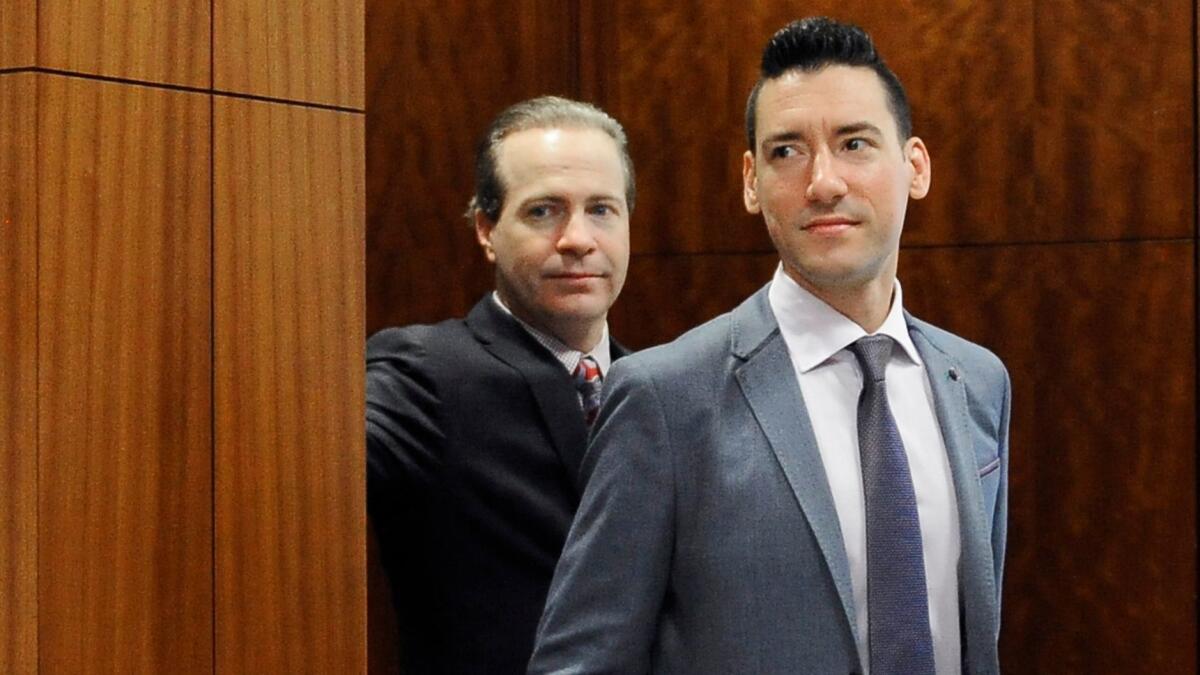The legal stakes at play in Californiaâs case against antiabortion activists

Californiaâs prosecution of two antiabortion activists on felony charges of invasion of privacy appears to be on solid ground, though the case is likely to test the strength of the stateâs ban on the surreptitious recording of others, legal experts said Wednesday.
Atty. Gen. Xavier Becerra unveiled a 15-count felony complaint Tuesday against activists David Robert Daleiden and Sandra Merritt alleging that they video-recorded 14 people without their consent at meetings with womenâs healthcare providers in Los Angeles, Pasadena, San Francisco and El Dorado.
An Irvine-based anti-abortion group founded by Daleiden later posted the video online, charging that Planned Parenthood was involved in the selling of fetal tissue.
Investigations eventually cleared the organization of the charges, but the reports sparked threats and violence against Planned Parenthood centers.
Stanford law professor Robert Weisberg said the state appears to have the evidence needed to win convictions.
For the activists to argue the recordings were âin the public interest to expose some very bad activity imputed to the victims here â well sorry, you canât do that,â Weisberg said. âBecerra is on very strong ground here.â
Other legal analysts were less certain.
UC Hastings law professor Rory Little, a former federal prosecutor, said the question of when deception can be used to gather information affects many areas of the law.
âThis one is really interesting because of the political tilt to it,â Little said. âWe generally feel like there is a privilege for journalists. If this were the Washington Post having infiltrated the Aryan Brotherhood gang, we might be cheering and saying, âGood work.â â
Little said a 1st Amendment defense by the activists would likely complicate the prosecution, particularly given âthe atmosphericsâ of the case.
âTo me,â Little said, âthe interesting question is not so much is this a hard criminal case to prove, but that there is going to be a 1st Amendment challenge to the use of the statuteâ in addition to charges of selective prosecution.
California has long had stronger privacy protections than most states. A right to privacy is even enshrined in the California Constitution.
But Californiaâs privacy laws have been tested most frequently in the context of civil litigation, not under the higher hurdles of criminal law.
The California Supreme Court decided in 1998 that the news media could be held liable for recording a private person without consent. The media should not âplay tyrant to the people by unlawfully spying on them in the name of news gathering,â the court said.
The case involved a reality television show broadcasting the words of an accident victim.
In a civil case four years after that decision, the court held that under the law, a person has a reasonable expectation of privacy if he or she does not expect that the conversation would be disclosed to a third person.
Experts said they knew of few criminal prosecutions like the kind Becerra has filed.
âIt is rare, but it is not bizarre,â Weisberg said. âIt is done occasionally, often in situations where the action is repetitive, where it almost becomes a stalking crime.â
The law has some exceptions, but only for exposing certain crimes, such as bribery and extortion, and to protect public safety, he said.
Daleiden has called the charges âbogusâ and âfake news.â
Horatio Mihet, chief litigation lawyer for Liberty Counsel, which is representing Merritt, confirmed that the defense would argue the pair had 1st Amendment rights as journalists and that the prosecution was politically motivated. Mihet, whose group handles religious liberties cases, called Becerra âa hired gun for Planned Parenthood.â
The law against secret recordings, however, does not shield journalists, Loyola law professor Laurie Levenson said.
âEven citizen journalists have to comply with criminal statutes,â she said. âThat is the bottom line.â
The activists were charged with secretly filming 14 different people in addition to a felony conspiracy count. The affidavit, filed in San Francisco, identified each victim as Doe to protect the workersâ privacy and safety.
Maximum penalties include stiff fines and years behind bars.
Levenson said prosecutions involving hidden recordings tend to be strongly fact-specific. Defendants can argue the subject had no reasonable expectation of privacy because there were others in the room, she said.
But using a hidden recording device is almost an admission that the other person assumed the conversation was private, said Levenson, a former federal prosecutor.
She called the charges âa very high-profile, perhaps ground-breaking use of the law,â but ânot a slam dunkâ for prosecutors.
âThis is really an important case in that it will help to define the boundaries for the confidentiality of organizations and the tactics that can be used in contentious issues like abortion,â she said.
Just hours after the criminal charges were filed, a federal appeals court decided 2 to 1 to uphold a preliminary injunction to prevent the activists from publicly releasing recordings that they made during meetings of an abortion rights group.
The panel of the U.S. 9th Circuit Court of Appeals rejected the claims of the anti-abortion activists that the order by a lower court judge violated the 1st Amendment.
Twitter: @mauradolan
More to Read
Sign up for Essential California
The most important California stories and recommendations in your inbox every morning.
You may occasionally receive promotional content from the Los Angeles Times.











